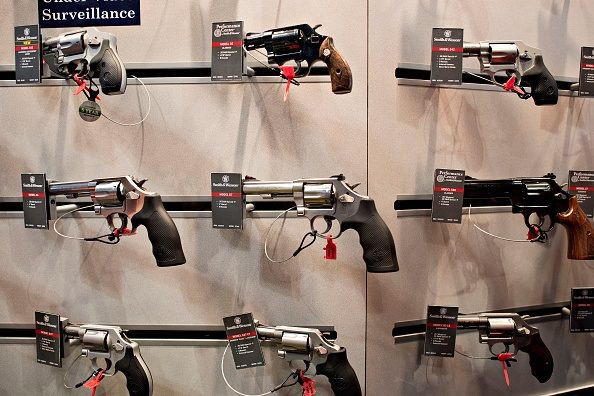Orlando Shooting: Gun Stock Investors See Profit In Rallying Shares Of Smith & Wesson Holding Corp (SWHC), Other Firearm Makers

Louis Navellier is hardly a firearm fanatic. The money manager’s house in Reno, Nevada, came with a shooting range in the basement, but he uses the space as a wine cellar. The heirloom guns he owns are locked in his safe and wrapped in cables, restrained from firing a single shot.
Yet late last year Navellier started snapping up shares of leading U.S. gun manufacturers as sales of pistols, revolvers and rifles continued to climb. Spurred by a relentless spate of mass shootings and terrorist attacks, including Sunday’s bloody assault on a gay Florida nightclub, Americans are purchasing more weapons than ever — either for personal protection or from fear of tougher gun control measures.
The FBI conducted a total of 23.1 million firearm background checks in 2015, the highest annual total on record, federal data show. Background checks this year are already on pace to top last year’s level and could surge in the fall as the presidential election nears.
“People think they’re going to lose their privilege to buy certain types of guns,” Navellier said by phone Monday from his other home near Palm Beach, Florida. “It’s very tragic,” he stressed, referring to the attacks and consumers’ gun-toting response to such events. As a financial opportunity, however, “It is what it is,” he added.
Navellier recalled watching shares of Smith & Wesson Holding Corp. (NASDAQ:SWHC) and Sturm, Ruger & Co. (NYSE:RGR) surge last November in the days after the Paris terrorist attacks, which left 130 people dead. He began buying positions in both companies; their stock prices spiked again when shootings in San Bernardino, California, left 14 people dead and 22 others seriously injured.
Shares in the two U.S. gun manufacturers similarly rose Monday a day after Omar Mateen killed 49 people and injured more than 50 others at the Pulse nightclub in Orlando. Massachusetts-based Smith & Wesson rose 6.87 percent, while Connecticut-based Sturm Ruger rose 8.5 percent. Vista Outdoor Inc. (NYSE:VSTO), an outdoor recreation company and major vendor of firearms and ammunition, held steady, with just a 0.19 percent increase.
Monday’s rally in firearm stocks is “based on an expectation that, over the next few months, you might see meaningful increased demand for firearms and ammunition,” said Rommel Dionisio, an analyst at Wunderlich Securities who follows the firearms sector closely. “Often these events do prop a wave of increased buying,” he added.
Gun sales have more than doubled over the last decade, from about 7 million in 2002 to about 15 million in 2013, the New York Times reported. While personal safety concerns do boost sales, fears that politicians will make it harder to access guns or restrict sales of certain weapons is considered the main driver.
A record 2 million guns were sold in December 2012 after President Barack Obama called for new buying restrictions in the wake of the mass shooting at Sandy Hook Elementary School in Connecticut, according to a Times analysis of federal data. And sales surged to 1.5 million in December 2015 after the attacks in Paris and San Bernardino prompted calls for stricter gun-buying laws.
Smith & Wesson — which reports its quarterly financial results on Thursday and whose pistols and revolvers are standard issue for policy and military forces worldwide — has seen its annual revenue jump about 61 percent since 2011, from $342.2 million to nearly $552 million in 2015. Sturm, Ruger saw its net sales jump 26 percent to $173.1 million in the first quarter, compared to the year-ago period, after it introduced new products like the AR-556 modern sporting rifle.
Navellier, who is chairman of the Nevada investment firm Navellier & Associates, said he accumulated positions in the two gun companies purely based on their fundamentals. He hasn’t acquired more shares in recent months because the stocks have grown more volatile: “They zig and zag,” he said.
In the week before the Orlando attacks, shares of Smith & Wesson and Sturm, Ruger fell about 7 percent and 5 percent, respectively, after the FBI reported a nearly 13-percent drop in firearm background checks in May compared with the prior month. Analysts at B&BT Capital Markets said Monday they were maintaining their “hold” recommendations for shares in the two companies, citing volatility and the possibility that demand may have peaked after a push in the last 18 months for additional gun restrictions.
Still, the analysts acknowledged their expectations for future financial results could shift in the runup to the 2016 presidential elections. Hillary Clinton, the presumptive Democratic nominee, has called for strengthening firearms background checks and tightening loopholes that make it easier for consumers to purchase guns. On Monday, Clinton renewed her call for an assault-weapons ban that could affect models like the AR-15, the type of weapon used in the attack on the Pulse nightclub.
“We believe Mrs. Clinton’s call may drive fears of restrictions and therefore spur additional buying in the near term,” BB&T analysts Brian Ruttenbur and Corbin Allen said in a research note provided by email.
The analysts said they initially expected the former U.S. secretary of state to take a moderate position on gun control during the general election. “If the call [for an assault-weapons ban] becomes one of Clinton's primary campaign positions, then we believe the fear may drive additional consumer demand,” they added.
© Copyright IBTimes 2024. All rights reserved.





















